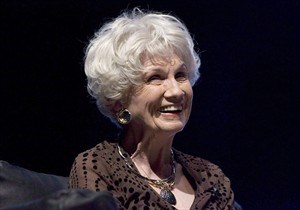
Canadian author Alice Munro is pictured in Toronto on October 21, 2009. Munro will be the toast of the book world Tuesday when her daughter Jenny receives the Nobel Prize in literature on her behalf in Stockholm. THE CANADIAN PRESS/Chris Young
December 09, 2013 - 5:30 AM
TORONTO - Canadian short story master Alice Munro will be the toast of the book world Tuesday when her daughter Jenny receives the Nobel Prize in literature on her behalf in Stockholm.
Literature lovers have been sharing their thoughts about the honour and expressing their well wishes for the 82-year-old Wingham, Ont., native, who is the 110th Nobel laureate in literature and only the 13th woman to receive the distinction:
___
London, Ont.-based Emma Donoghue, whose 2010 novel "Room" won a Rogers Writers' Trust Fiction Prize and was a finalist for the Man Booker Prize and a Governor General's Literary Award:
"She's become a one-word celebrity. When people say 'Alice,' you know that we mean Alice Munro, and that rarely happens to writers. Like many readers, I firmly hope that she hasn't really retired (as she said she was going to). I would beg her to give us a story a year, at least, and never stop."
Donoghue said Munro was probably the first Canadian writer she ever read while growing up in Dublin. She called her "the absolute master of the genre" who "forces people to take short stories seriously and to see that there's no limit to what you can achieve in maybe 10 pages."
"I would say in particular, as a short story writer, that she's important to me because short stories — this is not a good time for them, in general, and many readers are resistant to short stories, and the way to convert those readers is to say, 'Try Alice Munro!' Because her short stories offer the satisfactions that, in most cases, you only get in novels."
___
Oakville, Ont.-raised Dennis Bock, a 2013 Scotiabank Giller Prize finalist for his novel "Going Home Again," also implored Munro to keep writing:
"If you can keep doing what you're doing, do it for as long as you can, because it's a gift for Canadian readers and readers around the world. ... I really hope she's got some more years left and some more books left, because the work is astonishing."
Bock said he first read Munro's work as a first-year university student in 1983, when his professor assigned "Dance of the Happy Shades."
"It was the first time I'd read literary fiction that used idioms that I used myself, that was set in locations and places that I knew, populated by characters that I knew or could very easily have known, doing things that were very ordinary and within my own experience.
"So it was sort of a gateway into my own literary imagination at that time, which was closer to home, where I was looking for some magic close to home — some way of seeing the mundane in a new and spectacular way. And she did that, and she gave me and a whole bunch of other writers of my generation permission to look at what was right in front of them rather than having to go outside of our own experience."
___
Windsor, Ont.-based Alistair MacLeod, winner of the 2001 International IMPAC Dublin Literary Award for his novel "No Great Mischief":
"I was very glad that short stories won the prize, because when I published my first collection of short stories I think in 1976 she wrote me a letter saying, 'I'm really pleased to see this and I'm really pleased it's short stories.' So for a long time, Alice Munro and myself were in the McClelland & Stewart stable with Doug Gibson as short story writers. That was nice for both of us, and of course she went on to write 300 and I wrote 12.
"But it's nice to see her rewarded, it's nice to see the short story rewarded, and it's nice to see Canada rewarded. So I was very pleased for her to win. She's just spent her whole life doing short stories, and that's good, so I'm glad that the Nobel Prize people were noble enough to recognize that."
___
Dr. Bryce Traister, chair of Department of English and Writing Studies at the University of Western in London, Ont., where Munro studied as an undergraduate in the 1950s and returned as a Writer-in-Residence from '74-'75:
"I think one thing we can all learn from her recognition by Nobel is that, if you keep doing what you do with integrity and with commitment, good things will come from it. One really nice thing about it is, it gives us working in the university a great story to be able to communicate to our students who are at that point in their lives when they're wondering if they're going to be able to make anything out of their passions.
"And we can look to Alice Munro's example and say, 'We have good reason to think that you have a great future in which you will be able to make use of your passions, if it's creative writing or becoming a doctor or studying bird calls in South America. We still live in a world where your creativity and your genius has a place.'"
___
Victoria-based Esi Edugyan, who won the 2011 Giller for "Half-Blood Blues" and was on the jury for the prize this year:
"She's just one of our great, living geniuses."
___
German-raised Dan Vyleta, a 2013 Giller finalist for "The Crooked Maid":
"When I heard about Alice Munro, I was just jumping around, I was so pleased — pleased for Canada, pleased for her. It's just great."
___
Peter Englund, permanent secretary of the Swedish Academy:
"We love you, Alice, and we are extremely happy to be able to give you this prize, because you certainly deserve it."
News from © The Canadian Press, 2013